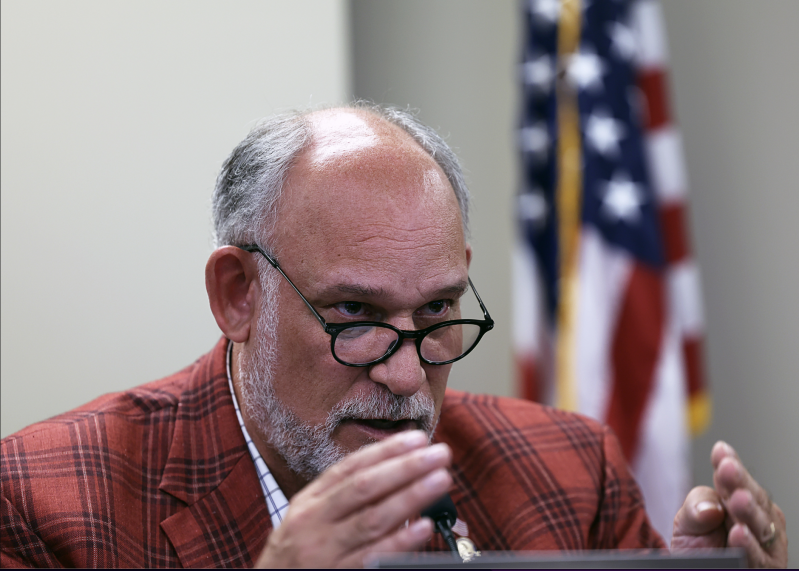
BY: LIAM NIEMEYER, Kentucky Lantern. Image Credit: Sen. Matthew Deneen, R-Elizabethtown (Kentucky LRC Photo)
Republican Kentucky Rep. John Blanton characterized the outlook of the drinking water utility serving the Magoffin County seat that he represents as “driving into a brick wall.”
Blanton, in a Wednesday legislative committee meeting in Frankfort, described the months of infrastructure challenges faced by the municipal drinking water utility Salyersville WaterWorks, which provides water for Salyersville and the county water district.
Among the issues Blanton listed were significant water leaks and water loss at the utility, a staffing shortage. Grinder pumps at residences, which grind up solid waste and pump it into a sewer line, are failing and causing sewage to come up in yards.
“My concern is for my constituents, and I get they’ve got to have money. But what good is throwing money at a problem if they don’t know how to fix it?” Blanton said.
Blanton was one of several state lawmakers, local advocates, and a representative with an industry group who expressed concerns or highlighted needs on Wednesday about drinking water and wastewater infrastructure, specific to local communities and statewide.
The meeting gathered a wide range of people to testify to lawmakers in Frankfort, ranging from clean drinking water advocates in Martin County to state officials who regulate drinking water and wastewater utilities.
Both Sen. Matthew Deneen, R-Elizabethtown, and Rep. Ashley Tackett Laferty, D-Martin, told those who testified about the need to also increase drinking water capacity in their communities as a matter of economic development.
“If we want to grow our economy in Eastern Kentucky, similar to some of these places that need other water investments, we need to invest in places such as Martin County and Floyd County and throughout Eastern Kentucky to make sure that we can attract businesses,” Tackett Laferty said.
Salyersville Mayor Stanley Howard and Magoffin County Judge-Executive Matt Wireman did not immediately return Wednesday afternoon interview requests.
The Salyersville Independent reported Howard declared a local state of emergency, citing ongoing infrastructure and financial challenges with the utility, including the failing grinder pumps. Wireman has also proposed potentially dissolving the utility and “transitioning responsibilities” to the county water district. On July 16, Magoffin County residents sued the city of Salyersville because of the “recurring problem of sewage backing up into their homes and onto their property” that had impacted over 100 homes, according to the lawsuit complaint.
Sprawling infrastructure needs
Scott Young, the executive director of the industry group Kentucky Rural Water Association, credited lawmakers at the meeting for passing laws in recent legislative sessions that have provided more funding and training opportunities to support utility staffing. But the infrastructure challenges facing drinking water and wastewater utilities in the state, he said, still loom large.
For example, the legislature created the Kentucky Water and Wastewater Assistance for Troubled or Economically Restrained Systems Fund to help struggling utilities deal with infrastructure, debt, and financial paperwork and audits. The state legislature allocated $75 million for the fund for the current fiscal year, but the fund has received about $750 million in requests from utilities, according to a state presentation. The U.S. Environmental Protection Agency, in a 2023 report, wrote Kentucky needs billions of dollars in drinking water infrastructure investment over the next 20 years.
Another issue Young pointed to: an aging workforce at utilities. Young referenced a University of Kentucky study from 2022 that surveyed workers at utilities, finding that “30% of operators and 40% of utility managers plan to retire within the next six years.”
“We don’t have enough operators and qualified personnel now, and so that’s very concerning moving forward,” Young said. “When 78% of the utilities in Kentucky serve a population of 10,000 (or less), they don’t have the resources or the operating budget to go out and hire some of the best.”
Testing the water
Water quality advocates from Eastern Kentucky and Martin County, a community that has long dealt with drinking water problems, also urged lawmakers to consider supporting the work of nonprofit groups trying to clean up waterways and improve drinking water.
Nina McCoy, chair of the Martin County Concerned Citizens group, told lawmakers about an ongoing study the group is doing in collaboration with the University of Kentucky, looking at disinfection byproducts in the county’s drinking water. The work is a continuation of a previous study that found levels of the byproducts — created during the normal water treatment process, with some being considered to be a probable carcinogen — in drinking water that regularly exceeded federal limits.
“Along with the tap water, we are also testing the source water. Because remember — we cannot forget that our water is not manufactured. It is coming from the river and has to be treated in so many different ways,” McCoy said. “What we’re trying to do with the University of Kentucky is understand: How does what’s in the source water affect what’s in the drinking water?” McCoy said the results of the more extensive study with the university should be available in the fall.
Republished from The Kentucky Lantern. Stories may be republished online or in print under Creative Commons license CC BY-NC-ND 4.0. We ask that you edit only for style or to shorten, provide proper attribution and link to our website. AP and Getty images may not be republished. Please see our republishing guidelines for use of any other photos and graphics.
Add comment
Comments